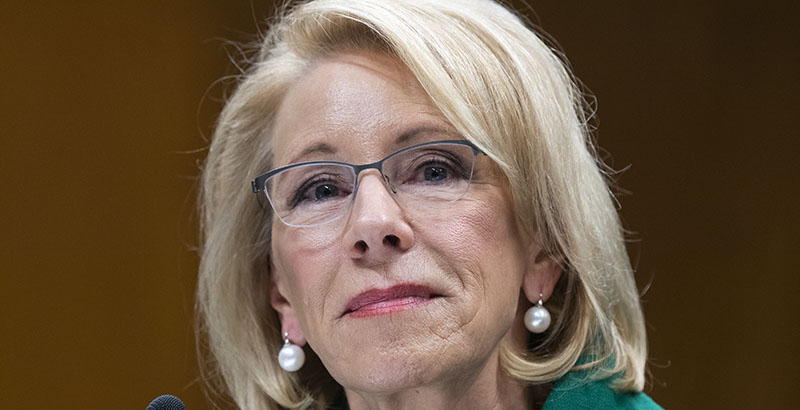Back on Capitol Hill, DeVos Addresses Pointed Questions on Budget, Coronavirus

Education Secretary Betsy DeVos struck a familiar note at a Senate hearing Thursday morning, arguing for President Trump’s 2020 budget request with a paean to local control and civic empowerment.
“Federal government spending does not determine everything that’s important to us,” she said before taking questions from members of the appropriations subcommittee on health and education. “Nor is it the only solution when we encounter challenges and opportunities. Instead, we the people overcome challenges and seize opportunities.”
The lines were identical to her opening remarks at a budget hearing at the House of Representatives last week, when she first spoke in defense of a proposal that would consolidate 29 federal education programs into a block grant to be disbursed to state governments. That gathering saw Democrats vent loudly about the administration’s proposal to create a $5 billion federal tax credit that could be used for private school scholarships; one member even called for DeVos’s resignation.
Cooler heads prevailed in the upper chamber, and the top lines of inquiry varied as well. Senate Democrats largely avoided the topic of school choice, instead steering the focus to the scope of DeVos’s requested cuts to the Department of Education. Several members also queried the secretary on the ongoing response to the coronavirus outbreak.
Though striking a measured tone throughout, the panel’s Democrats repeatedly returned to the administration’s proposed spending reductions. Near the end of questioning, Senator Joe Manchin of West Virginia pressed DeVos on the dissolution of McKinney-Vento funding for students experiencing homelessness.
“I’ve been a governor, so I understand block grants, and I understand flexibility,” he said, nevertheless asserting that the nearly $5 billion in potential cuts to the 29 programs would leave state officials “stymied” when responding to educational problems like homelessness.
“What you’re trying to say [is], there’s 29 programs, and your recommendation is reducing it $4.7 billion,” he said. “You’re saying that West Virginia should look at all these programs, how they service these kids in these 29 areas, and decide what we can do with less money?”
Throughout the morning, DeVos answered by arguing in favor of the new autonomies provided to governors by receiving block grant funding, which would allow them to redirect federal monies as they see fit. That rhetorical tack didn’t persuade Hawaii Democrat Brian Schatz, who urged her to separate the issue of block granting from the billions of dollars in lost support for previously funded priorities.
“The fact is, your budget has a $4.7 billion cut, and the answer to the question, ‘Why did you cut education by $5 billion?’ cannot be as though you’re answering the question, ‘Why are you doing block grants?’” he said. “The basic question I have for you is, why cut $5 billion from public education?”
Wisconsin Sen. Tammy Baldwin pointedly asked about the effects of proposed reductions to Title IV spending on student support and enrichment. That spending, she noted, was often earmarked for student health and safety.
“By cutting funding that schools can use for student health, aren’t you making it harder for them to respond to these new demands, like the outbreak of the novel coronavirus? And have you done any sort of assessment of what those costs are going to be as we look at an all-government response to the coronavirus?”
“I think what the proposal suggests is that those closest to the students are best able to target the resources to the students that are most vulnerable in their area,” DeVos responded.
The coronavirus was a hot topic at the hearing, as districts have considered school closures to protect students and staff from the threat of a fast-spreading epidemic. Oregon Democrat Jeff Merkley noted that schools in his home state were “desperate for guidance” on proper methods for ensuring student safety.
DeVos answered by referring to the department’s efforts to disseminate timely updates on public health as part of a cross-administration response to the emergency.
A working group established within the department, she said, “is in regular, frequent, multiple-times-daily contact with the CDC [Centers for Disease Control and Prevention] for updates from them on the latest developments.”
Ranking Member Patty Murray, a Democrat from the state of Washington, called the growth of the sickness “truly a serious crisis,” noting that schools in her daughter’s district had already announced lengthy closures. Eleven people in the state have already died from the virus.
“The administration’s response so far, I have to tell you, has not inspired confidence, and there’s a lot more unknowns than knowns.”
Get stories like these delivered straight to your inbox. Sign up for The 74 Newsletter

;)
